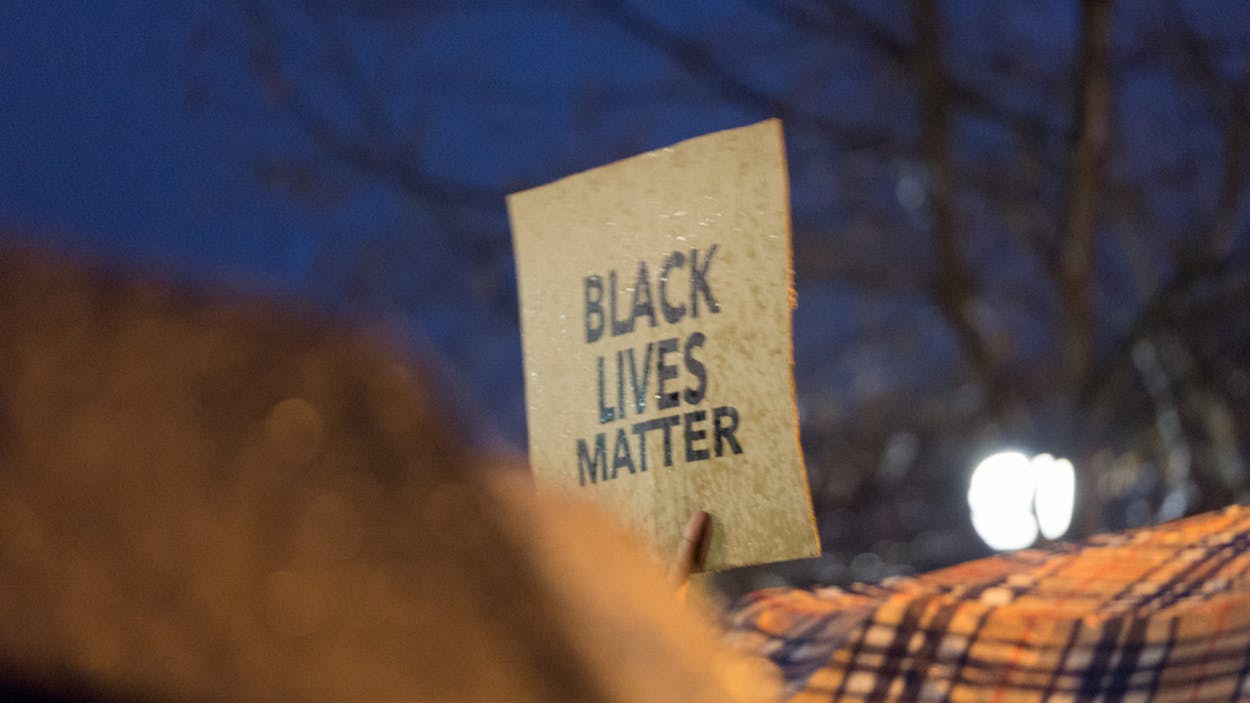Last week, the case of retired Austin Police detective Charles Kleinert took another turn. Kleinert was indicted last year for the 2013 death of Larry Jackson Jr., an unarmed black man who visited a Central Austin bank just after it had been robbed. Jackson wasn’t a suspect in the crime, but after speaking with the man a bank manager informed Kleinert, who was investigating the crime scene, that he suspected that Jackson may have come to the bank in an attempt to commit fraud. Kleinert began to pursue Jackson, chasing him initially on foot, and then by car after commandeering a civilian vehicle. When he finally reached Jackson, the two struggled, and Jackson was shot in the head.
The entire encounter was bizarre enough to warrant a manslaughter indictment, making Kleinert the first officer to be charged with that crime in over a decade. The woman whose car Kleinert commandeered told KVUE earlier this year that the officer’s behavior troubled her.
“The male was breathless and agitated and yelled, ‘Go go go’ and ‘follow him’ multiple times,” Bethune said. “He seemed very out of control and highly agitated. I was uncertain if he was really a police officer or not. I realize that either way I needed to remain calm and help him try to calm down. He did not identify himself any further once in the car. He did not tell me his name or offer any explanation as to what was going on. It was very obvious to me that he was trying to pursue someone since he kept telling me to ‘go’ and ‘follow him.'”
Kleinert testified before the grand jury that he chased Jackson because it “would be derelict in [his] duties to not give chase,” and that he commandeered the car to catch up to him. He described the shooting as an accident that came about because he had his gun out, and it fired accidentally when he fell, according to KVUE.
None of that was at the heart of Kleinert’s defense in recent months, though. Kleinert’s defense team centered their strategy not on exonerating their client for his actions, but on invoking an 1889 Supreme Court ruling that guaranteed federal agents immunity from prosecution in state courts. Lee Yeakel, a federal district judge out of Austin, found that because of that ruling Kleinert couldn’t be prosecuted. He dismissed the charges with prejudice.
Legal precedent is such that a Supreme Court ruling—even ones from nearly 130 years ago—is the final word in these situations. But though there are valid questions to ask regarding whether the nature of policing has changed enough in the thirteen decades since to warrant a re-examination of that ruling, there’s another urgent question at issue: Was the ruling applied correctly in this case?
That’s a question that will now be asked at a level above Judge Yeakel’s courtroom: Travis County District Attorney Rosemary Lehmberg announced Monday afternoon that she will appeal the district court’s ruling.
Travis County District Attorney Rosemary Lehmberg said she will appeal — potentially all the way to the U.S. Supreme Court — a federal judge’s ruling to dismiss manslaughter charges against a former Austin police detective.
In an interview with the American-Statesman and KVUE-TV on Monday, Lehmberg repeatedly said she is offended by U.S. District Judge Lee Yeakel’s decision to grant Charles Kleinert special protective immunity and that she has instructed prosecutors to begin drafting appeals to the 5th U.S. Circuit Court of Appeals in New Orleans.
“Whatever it takes to put that in motion, that is what we did this morning,” Lehmberg said. “I intend to pursue it as far as it takes.”
The main question is if Kleinert was acting as a deputized federal agent at the time that he shot and killed Jackson. The argument that swayed Judge Yeakel was that Kleinert, a member of the Central Texas Violent Crime Task Force—a partnership between the FBI and the Austin Police Department—was acting as a federal agent when he pursued Jackson.
Kleinert’s task force was formed to combat violent crime, but no one argues that Jackson was violent, or suspected of a violent crime. Rather, the crime Kleinert suspected Jackson of was attempted bank fraud. That is a federal crime, though, which Judge Yeakel determined meant that Kleinert was acting in his capacity as part of the task force when he chased the unarmed Jackson in a civilian’s car.
Now that Lehmberg has told reporters that she’ll appeal Judge Yeakel’s ruling, any number of points could be re-examined. Was Kleinert actually acting as a federal agent and immune to prosecution at the time he killed Jackson? Should the Supreme Court’s 1889 ruling should still apply today?
For the latter conversation to happen, Kleinert’s case will have to be appealed all the way to the Supreme Court, a likely scenario no matter how the 5th Circuit Court of Appeals rules. Lehmberg is ready, and it’s safe to assume that Kleinert’s legal team would file its own appeal should the 5th Circuit find for the prosecution. Whether the Supreme Court is interested in reviewing the case is a big question mark that we won’t see answered for a long time—but whether the man who killed Larry Jackson Jr. will have to answer for what happened in court is no less prominent today than it was in the years since the shooting occurred.








